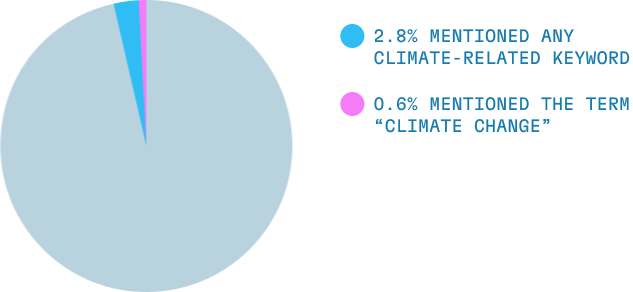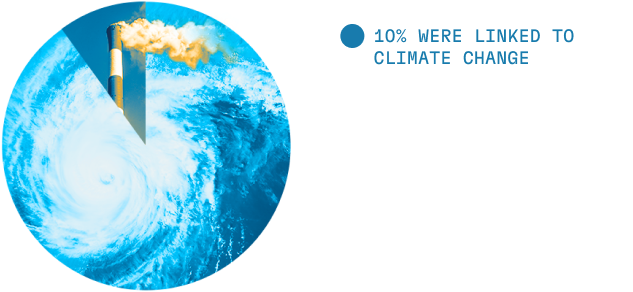The Climate Reality Check
A Bechdel-Wallace Test for a World on Fire
Check out our simple tool to evaluate whether our climate reality is being represented in our on-screen stories. We put the 2024 Oscar-nominated films through the Climate Reality Check. Here’s how it went.
A Glaring Absence
The Climate Crisis is Virtually Nonexistent in Scripted Entertainment
This groundbreaking report, produced by Good Energy and the USC Norman Lear Center’s Media Impact Project, is a first-of-its-kind analysis of 37,453 TV and movie scripts from 2016-2020. Our findings confirm what we all suspected: there is a glaring absence of climate change in scripted media.
The Process:
We studied 37,453 scripted TV episodes and films released between 2016 and 2020, to find out how frequently they featured climate change, including 36 related keywords.
The Results
Only 2.8% of all scripts included ANY climate-related terms.
We hunted for keywords like “global warming,” “climate crisis,” “sea level rise,” “solar panels,” “save the planet”—you get the idea.
Only 0.6% of scripted TV and films used the specific term “climate change.”
Of All Analyzed Scripts...

The most extreme and urgent disasters are almost never linked to their actual cause: climate change.
Only 10% of all extreme weather events on-screen were linked in any way to climate change. This makes the climate crisis appear one tenth of its real magnitude.
Of all extreme weather events on-screen...

But some shows and films are already doing the work to bring climate into their stories.
Madam Secretary (CBS) alone had 94 climate mentions in 20 unique episodes—more than the total for any other broadcast network—and included in-depth storylines on the climate crisis.
The biggest takeaway
According to a wide survey...
Modern audience members feel existing characters don't share their level of concern about climate.
More than three in four respondents (77%) report learning about social issues from fictional TV or film at least occasionally. However, only 25% say they hear about the climate crisis from fictional TV or fictional films.
How often do people learn about social issues from fictional TV or film?

Audience members have difficulty recalling any recent climate portrayals on-screen, positive or negative.
- When we asked people when they last saw a portrayal of climate change on-screen, by far the most common response was “I don’t know” (68%), followed by 2004’s The Day After Tomorrow and the Mayan prophecy disaster film 2012, which was not about climate change.
One in two people want to see fictional TV and films that include climate-related storylines.
The Plan
Based on our research findings, Good Energy and our partners are providing a game plan for the entertainment industry to normalize climate conversations and authentically explore the realities of the climate crisis in scripted entertainment:
Relate climate to EVERY genre
Most climate content appears in dramas, but that doesn’t mean you can’t make ’em laugh: audience members are interested in seeing the climate crisis addressed in comedy, action adventure, sci-fi, and more!
Connect The Dots
Even when the climate crisis is mentioned, it’s rarely connected to the oil and gas industries that caused it or the extreme weather events it causes. Drawing more explicit connections can make the climate crisis feel more concrete.
Give voice to climate anxiety
Why do people seek out entertainment? Aside from a mood boost, they want connection: the opportunity to share characters’ experiences and identify with their outlooks on life. Portraying climate anxiety, fear, guilt, and grief on-screen can inspire audiences and make them feel less alone.
Show the intersections
The climate emergency isn’t just an “environmental” issue; it overlaps with all the issues audiences care about: racism, sexism, mental health, class, war, disability, and more. The climate crisis harms historically marginalized people first and worst.
Lights, camera, action!
When it comes to climate, audiences are hungry for solutions: for actions they can take to reduce their own carbon footprint and collectively influence climate policy. By showing practical, effective responses to the crisis, you’ll help people believe that change is possible. This is the stuff of great stories: the interpersonal politics, the life-and-death stakes.